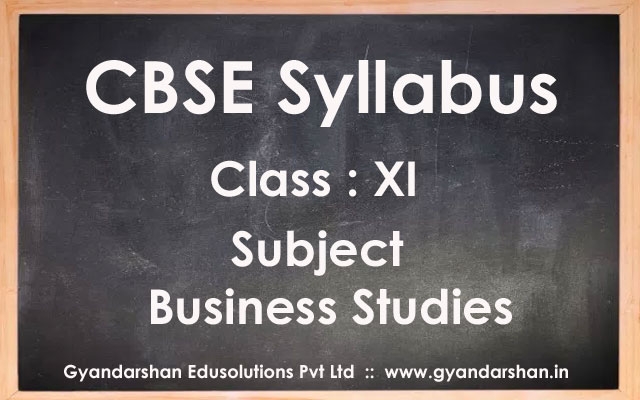
Business Studies Class XI Syllabus
Exam Structure
| Units | Topic | Marks |
| Part A | Foundations of Business | |
| 1 | Nature and Purpose of Business | 20 |
| 2 | Forms of Business Organisations | |
| 3 | Public, Private and Global Enterprises | 18 |
| 4 | Business Services | |
| 5 | Emerging Modes of Business | 12 |
| 6 | Social Responsibility and Business Ethics | |
| Part B | Finance and Trade | |
| 7 | Sources of Business Finance | 20 |
| 8 | Small Business | |
| 9 | Internal Trade | 20 |
| 10 | International Business | |
| 11 | Project Work | 10 |
| Total | 100 |
Part A: Foundation of Business
Unit 1: Nature and Purpose of Business
- Concept and characteristics of business.
- Business, profession and employment – Meaning and their distinctive features.
- Objectives of business – Economic and social, role of profit in business.
- Classification of business activities: Industry and Commerce.
- Industry – types: primary, secondary, tertiary – Meaning and sub types.
- Commerce – trade: types (internal, external, wholesale and retail; and auxiliaries to trade: banking, insurance, transportation, warehousing, communication, and advertising.
- Business risks – Meaning, nature and causes.
Unit 2: Forms of Business organizations
- Sole Proprietorship – meaning, features, merits and limitations.
- Partnership – Features, types, merits and limitations of partnership and partners, registration of a partnership firm, partnership deed. Type of partners.
- Hindu Undivided Family Business: features.
- Cooperative Societies- features, types, merits and limitations.
- Company: private and public company -features, merits and limitations.
- Formation of a company- four stages, important document (MOA, AOA, relevances of certificate of incorporation and certificate of commencement.
- Starting a business – Basic factors.
Unit 3: Public, Private and Global Enterprises
- Private sector and public sector enterprises.
- Forms of public sector enterprises: features, merits and limitations of departmental undertakings, statutory corporation and Government Company.
- Changing role of public sector enterprises.
- Global enterprises, Joint ventures, Public Private Partnership – Features
Unit 4: Business Services
- Banking: Types of bank accounts- savings, current, recurring, fixed deposit and multiple option deposit account.
- Banking services with particular reference to issue of bank draft, banker’s cheque (pay order), RTGS (Real Time Gross Settlement) NEFT (National Electronic Funds Transfer), bank overdraft, cash credits and e- banking.
- Insurance: principles, concept of life, health, fire and marine insurance.
- Postal and telecom services: mail (UPC, registered post, parcel, speed post and courier) and other services.
Unit 5: Emerging Modes of Business
- E-business – scope and benefits, resources required for successful e-business implementation, online transactions, payment mechanism, security and safety of business transactions.
- Outsourcing-concept, need and scope of BPO (business process outsourcing) and KPO (knowledge process outsourcing).
- Smart cards and ATM’s meaning and utility
Unit 6: Social Responsibility of Business and Business Ethics
- Concept of social responsibility
- Case for social responsibility
- Responsibility towards owners, investors, consumers, employees, government and community
- Environment protection and business
Part B: Finance and Trade
Unit 7: Sources of Business Finance
- Concept of business finance
- Owner’s funds – equity shares, preference share, GDR, ADR, IDR and retained earnings.
- Borrowed funds: debentures and bonds, loan from financial institution, loans from commercial banks, public deposits, trade credit, ICD (inter corporate deposits).
Unit 8: Small Business
- Small scale enterprise as defined by MSMED Act 2006 (Micro, Small and Medium Enterprise Development Act).
- Role of small business in India with special reference to rural areas.
- Government schemes and agencies for small scale industries: (National Small Industries Corporation) and DIC (District Industrial Center) with special reference to rural, backward and hilly areas.
Unit 9: Internal Trade
- Services rendered by a wholesaler and a retailer
- Types of retail – trade – Itinerant and small scale fixed shops
- Large scale retailers – Departmental stores, chain stores, mail order business
- Concept of automatic vending machine
- Chambers of Commerce and Industry: Basic functions
- Main documents used in internal trade: Performa invoice, invoice, debit note, credit note. LR (Lorry receipt) and RR (Railway Receipt)
- Terms of Trade: COD (Cash on Delivery), FOB (Free on Board), CIF (Cost, Insurance and Freight), E&OE (Errors and Omissions Excepted)
Unit 10: International Trade
- Meaning, difference between internal trade and external trade: Meaning and characteristics of international trade.
- Problems of international trade: Advantages and disadvantages of international trade
- Export Trade – Meaning, objective and procedure of Export Trade
- Import Trade – Meaning, objective and procedure: Meaning and functions of import trade; purpose and procedure
- Documents involved in International Trade; documents involved in export trade, indent, letter of credit, shipping order, shipping bills, mate’s receipt, bill of lading, certificate of origin, consular invoice, documentary bill of exchange (DA/DP), specimen, importance
- World Trade Organization (WTO) meaning and objective













